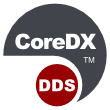CoreDX DDS v3.0 is Now Available!
About CoreDX DDS v3.0
The release of CoreDX DDS v3.0 offers new features, increased performance, and more, all in the small footprint you expect.
Twin Oaks Computing is excited to announce CoreDX DDS v3.0, our third generation implementation of the Data Distribution Service (DDS). The previous version of our product offered a DDS implementation with a low line of code (LOC) count. CoreDX DDS v3.0 enhances our small footprint capability by supporting extremely low CPU and memory utilization. Our new version will significantly expand the reach of DDS to systems that have minimal CPU, memory, and disk resources. In addition, any application that is compute intensive can now support a DDS middleware without consuming a large amount of precious CPU resources. We achieved this result with no trade-off on performance compared with other DDS implementations that require significantly more system resources to run efficiently.
In addition, Version 3.0 adds many new features including: support for Dynamic Types, advanced QoS features (Lifespan, Source Order, Exclusive Ownership, and Reader Data Lifecycle), and an improved directory structure for ease of use.
CoreDX DDS still includes the standard features that you expect: strict adherence to the DDS API, full support for the Real-Time Publish Subscribe wire protocol for open interoperability, and ease-of-use that is second to none.
Dynamic Type Technology
A feature exclusive to CoreDX DDS is support for Dynamic Type Technology. This innovative new technology eases system integration challenges, and enables bridging DDS data between disparate systems in a flexible and dynamic environment. This technology enables DataReaders to dynamically, at run-time, determine the topic data types. Through Dynamic Type introspection, the subscribing application can explore the data type and access data fields.
Dynamic Type Technology from Twin Oaks Computing is a critical component for the deployment of useful DDS bridging solutions. Without this technology, DDS bridges must be maintained and upgraded in lock-step with the systems they support. Dynamic Types offer a flexible solution that lowers Total Cost of Ownership.
Expanded Quality of Service (QoS) Support
CoreDX DDS now supports all of the QoS policies defined in the Minimum Profile plus Content Filters, and Exclusive Ownership. The rich set of QoS policies available to system designers enables the development of robust publish subscribe communications architectures that address a wide range of domains:
- Event driven processing, with low-latency distributed event notification
- Situation monitoring, with multiple dynamic monitoring stations
- Embedded sensors, with hard resource constraints
- Distributed workload, with filter enabled segregation of data streams
The Exclusive Ownership QoS policy is a powerful technology that enables the design of redundant and fault-tolerant systems where immediate fail-over is a critical requirement. The ability to operate multiple, redundant, data writers, with the ability to dynamically detect the failure of a primary and automatically selecting a backup is now supported by CoreDX DDS.
New support for RTPS protocol configuration allows developers to adjust timing characteristics of the RELIABLE handshake (HeartBeatPeriod, HeartBeatResponseDelay, and NackResponseDelay). This allows fine grained control over important characteristics of the transport.
CoreDX DDS has always supported the LatencyBudget QoS. With a latency budget, the middleware can optimize data transmission by coalescing samples to achieve optimal network utilization. This, coupled with the non-blocking nature of CoreDX DDS DataWriters can be used to achieve high throughput while lowering CPU utilization. And, it is easy to use -- just define a non-zero latency budget, and CoreDX DDS takes care of the rest.
CoreDX DDS Performance
The performance of CoreDX DDS is competitive with any other comparable middleware technology. We offer this comparable performance with less code, lower CPU utilization, and smaller run-time memory requirements. For example, CoreDX DDS can achieve 800 Mbps throughput while consuming only 300KB of memory and 10% of available CPU resources! Please see performance for the full analysis of CoreDX DDS performance.
Get Started!
We make it easy to get started with CoreDX DDS. We offer Free 30 day evaluations, with an easy to manage licensing model. We provide training and other services to ensure that your project is successful.
Visit the download page to pick up an evaluation today.







